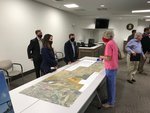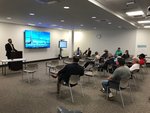

FAIRHOPE – Eastern Shore Metropolitan Planning Organization members plan to vote Wednesday, June 9, on the question of adding a new Interstate 10 bridge over the Mobile River and Bayway improvements to upcoming state highway projects.
The MPO and Alabama Department of Transportation held a public meeting Wednesday, May 19, to discuss the proposals.
Edwin Perry, ALDOT regional pre-construction engineer, said the current plans calls for construction in three phases.
The first phase would include a four-lane toll bridge over the Mobile River for commercial trucks. That phase would also include restriping the Bayway to increase the number of lanes in each direction from two to three.
The second phase would include adding a second bridge. A new elevated highway over Mobile Bay would be part of the third phase.
“Phasing the project allows the project to start sooner and provide congestion relief,” Perry said. “It removes the signed hazardous detour route from Africatown and provides additional capacity for trucks crossing the river.”
He said work on the first phase of the project could start next year.
“We are anticipating that it will take six to nine months to complete the additional studies to phase the project and it will be mid to late 2022 until the project can be ready to start the first phase,” Perry said.
Members of the MPO said building the project in phases would take too much time as traffic counts increase.
“A new Bayway must be finished as the bridge is constructed,” Baldwin County Commission Chairman Joe Davis said. “Just moving the bottleneck from one place to the other isn’t an improvement. We know it’s going to take money and we’re going to do everything we can to address that.”
Davis said traffic numbers on I-10 continue to grow. He said the highway over Mobile Bay is one of the biggest bottlenecks on I-10, which extends from Jacksonville, Fla. to Los Angeles.
“This is vital to this entire region. Mobile and Baldwin County both will prosper if we can get this done,” Davis said. “If the bridge is started today, we’re looking at four years. How much is the traffic going to increase between Mobile and Baldwin County? How much can it increase before the infrastructure fails?”
Fairhope City Council President Jack Burrell, chairman of the Eastern Shore MPO, said the phased approach would work, but still leaves questions.
“We asked the governor to ask ALDOT to come up with a plan that would work, and this will work,” Burrell said. “This is a plan that will work. This phased approach will work. As we talked about it though, well, can we afford to wait on Phase 2? Can we afford to wait on Phase 3? Because we really need the entire scope of the project done sooner rather than later. How is Phase 2 going to be paid for? How is Phase 3 going to be paid for? We don’t know that.”
He said one alternative could be to seek a loan from the federal government at a low interest rate, or no interest, to build the entire project. The total cost of the work was estimated at $2.1 billion in 2019. He said the cost could be paid with a toll on the new bridge of about $2.25 with no tolls on the current Bayway or other existing roads and tunnels.
Burrell said the project could be paid for in 20 years, allowing tolls to be lifted.
Audience members said they were concerned about the effect of tolls proposed for trucks in the first phase.
Daniel Wright is president of the trucking company Wright Transportation in Mobile and is also on the board of the Alabama Truck Association. He said the entire burden of paying for the first phase should not be placed on the trucking industry.
“We want to be a part of the solution,” Wright said. “Our industry has always been a part of the solution in infrastructure and things of that nature. We just feel that in this project, our industry has been singled out to pay for this entire bridge. We don’t think it’s fair. We don’t necessarily think it’s a long-term solution.”
Africatown resident Joe Womack Jr. said that if tolls are placed on trucks going over the new bridge, truckers will use the Africatown Bridge to avoid paying.
“For the last 10 years I worked, I was a trucker and I know we used to run around tolls and scales all the time to save money,” Womack said. “What guarantee that those trucks are not going to just run around that toll?”
He said increasing traffic on the Africatown Bridge would hurt residents’ efforts to develop the area’s potential as a site for visitors.
Perry said the studies scheduled to be done before construction will look at the potential effects of tolls on traffic in the area, including Africatown.
Burrell said trucks carrying hazardous materials are now detoured over the Africatown Bridge. He said the toll bridge would allow those vehicles to avoid the detour through the community.
“Every truck that pays that toll is one less truck going through Africatown,” Burrell said.